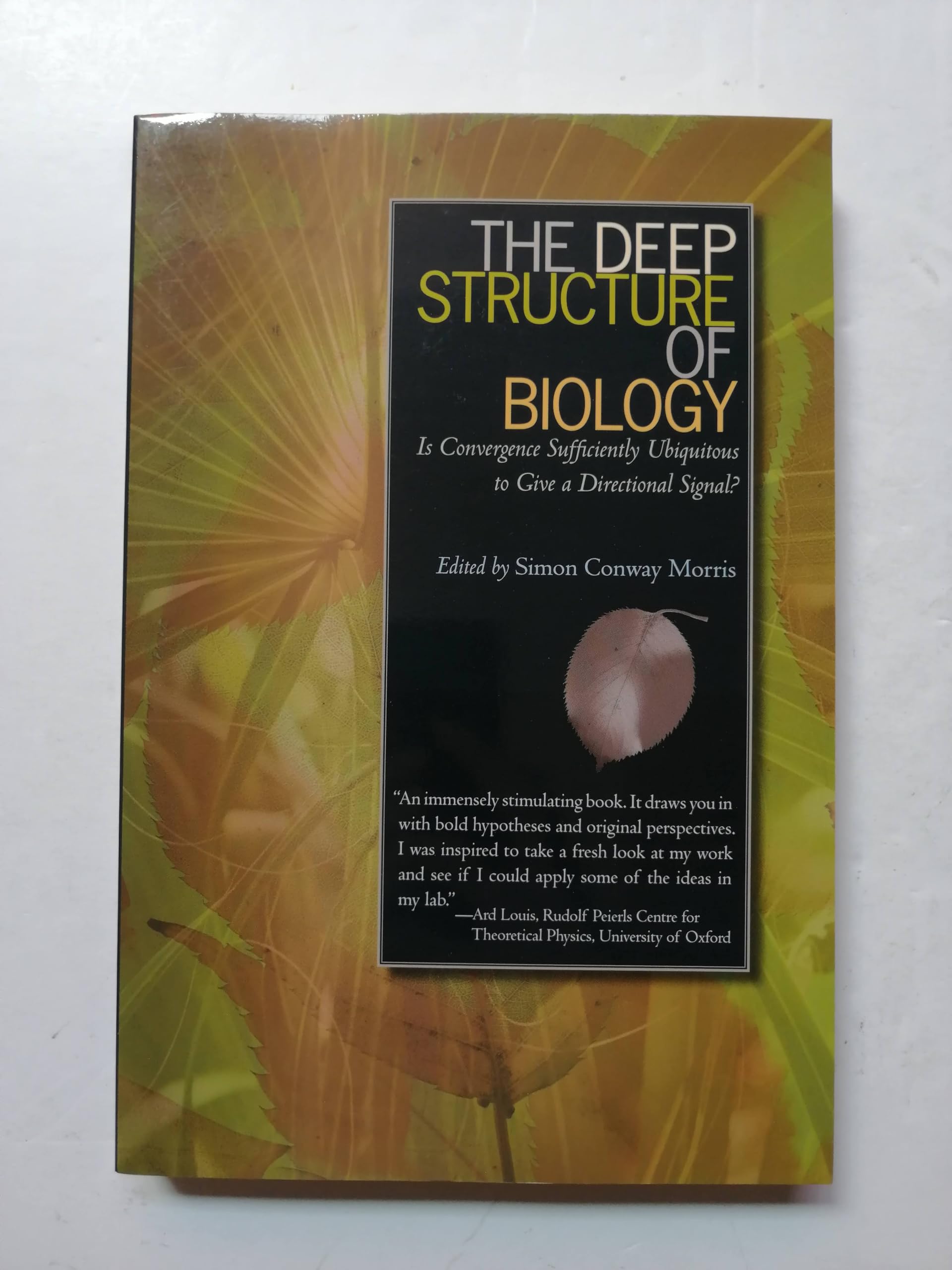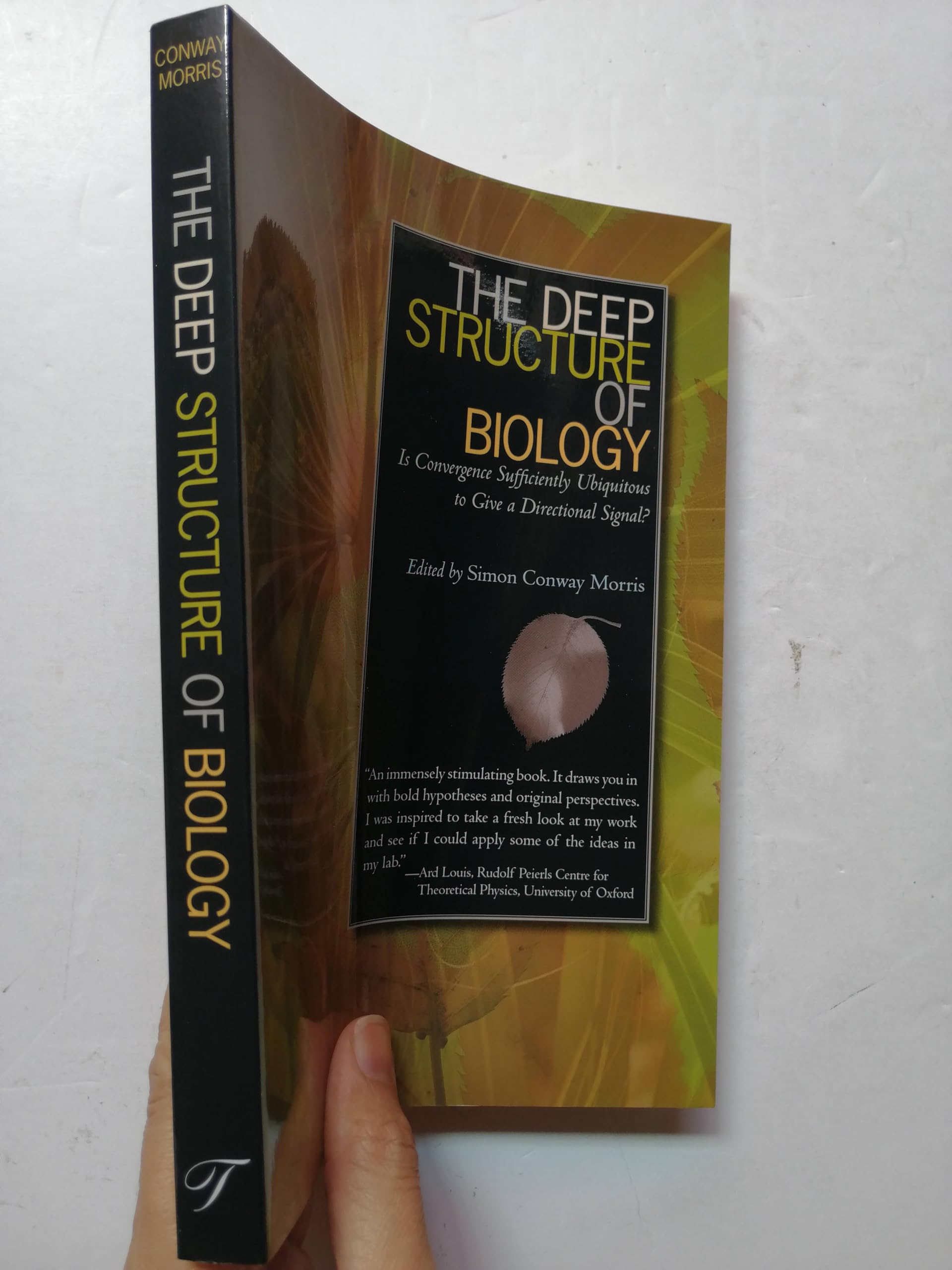Customer Services
Copyright © 2025 Desertcart Holdings Limited
Desert Online General Trading LLC
Dubai, United Arab Emirates



Full description not available
C**S
For biologists and non-biologists alike
The Deep Structure of Biology opens up new areas of investigation into the underlying mechanics of evolution, and will appeal to anyone interested in science writing at the cutting edge of discovery and analysis, or in the serious end of the science-religion debate.The book comprises thirteen essays, ten by scientists, one by a philosopher and two by theologians. The inclusion of the latter -- with the Templeton Foundation as the publisher -- may engender suspicion amongst some naturalists as to whether the whole thing is thinly-veiled religious propaganda, so it's worth noting that the first section of the book -- 69% of the text space -- is straight science and that the book stands as an important text on this basis alone. The second section of the book is dedicated to discussions on the question of whether evolution might reflect purpose, from both naturalistic and theological perspectives, which I found thoughtful and scholarly. (Authors on both sides of the debate fully accept Darwinian natural selection and don't support so-called "intelligent design").Deep Structure builds on one of Simon Conway Morris's previous books, Life's Solution , which extensively detailed the ubiquity of convergent evolution, and laid out the case for viewing it as far more than the odd biological curiosity. The first section of Deep Structure takes the next step in unpacking and organising convergence as a key indicator of the underlying mechanics of evolutionary change. It details convergence at the most general, functional levels -- for example, the independent emergence of social co-operation, play, tool-making, music, vocalisation, culture and intelligence -- including interesting accounts of research by specialists in ants, crows, whales and plants. For those with a mathematical bent, there is a fascinating essay on the analytical techniques of theoretical morphology, including the modelling of morphospace (quite distinct from a fitness landscape), and raising the intriguing possibility of a periodic table of life. Another important essay explores and integrates the perspectives of Gould (which stresses contingency) and De Duve (which stresses predictable directionality) at a detailed mathematical level, well beyond the obvious fact that evolution incorporates both random events and selection.I found the second section interesting and well worth reading, but also a little disappointing, partly because I was already familiar with the major portion of the naturalistic analyses of purpose -- or the lack of it -- in evolution, partly because I felt there were philosophical implications of convergence that weren't addressed in the section, and partly because I didn't feel that the meaning and sub-meanings of purpose were fully teased out. Perhaps I expected too much of four essays. The question of whether evolution -- or existence as whole -- reflects purpose probably merits a book-length set of essays dedicated to this one question alone. Having said this, I found the writing stimulating and was glad to see one of the writers raise a simple but important point about perceptions of evolution that exactly parallels my own thinking. As the writer points out, there is a tendency to mentally segregate chance and predictable directionality, and to enthrone one or the other as the primary explanatory principle of living systems, whereas in reality the two are entwined, along with time, in the narrative of life, and -- I'd add -- in the narrative of existence as a whole, at least at the readily observable scale (and perhaps deeper, given the resuscitation of Bohmian mechanics as an alternative quantum theory).I would have welcomed more exploration of these segregated enthronements, especially the particularly unfortunate consequences of their more popular and less scientific forms, such as the traditional determinism-is-king idea, which has littered history with its false notions of destiny and glory, and the currently popular chance-is-king idea, which -- in the face of existence and human life conceived as fundamentally random and therefore meaningless -- seems to be responsible for an anything-goes, construct-your-own-meaning culture, or a self-centred superficiality that sets aside the deeper questions of life altogether. Fortunately, the directionality toward functional competence implicit in evolutionary convergence -- as outlined in Deep Structure -- points to the possibility of a similar directionality toward functional competence in the evolution of human culture and mentation, so -- with a little luck and judicious selection :-) -- we might learn to replace enthronement with entwinement.Be that as it may, I'd stress again that Deep Structure can be read solely in terms of its scientific content, and as such it's an extremely interesting and important document. Indeed, for anyone setting out on a career in biology, I'd say it's essential reading. For myself, I can't wait for the next episode -- of the science, of its philosophical implications, and of the conversation between science and religion.
P**K
A collection of fascinating essays
This book is a collection of thirteen papers presented at the symposium "Purpose in Evolution," organized and sponsored by the John Templeton Foundation, hosted by the Vatican Observatory in June 2004, and edited by Simon Conway Morris. The papers are very up-to-date descriptions of currently active areas of scientific investigation, as indicated by the many references to work published in 2006 and 2007.As a non-biologist, I found the papers to be fascinating and very readable, particularly George McGhee's discussion of a "periodic table of animals" and Anthony Treivavas' essay, "Aspects of Plant Intelligence". I will never look at a plant the same way again. Equally interesting was the fact that scientists don't yet know how plants pass information along. There is also an interesting table of organizational analogies between trees and social insects. Nigel Frank's essay describes animal intelligence (the ability to solve problems) through a discussion of his fascinating research on the rock ant.A good case is made for convergence in evolution. The issue then is: Does biological evolution have a purpose? The three philosophical / theological essays at the end were somewhat disappointing in that they didn't really reach any strongly supported conclusions. Nevertheless, I highly recommend this book to anyone who wants to get a feel for what is going on in evolutionary biology research, regardless of how you happen to feel about the theory of evolution.
T**.
Fine collection on controversial topic
The topic of evolutionary convergence has become a controversial area among evolutionary theorists. There are those who hold to the strict Darwinian dogma that evolution is random and displays no directionality at all. This collection of essays by various scientists, a few philosophers, and one or two theologians largely favors the position that evolution arrives at identical or very similar structures (such as the camera eye), indicating that there is some sort of structured order in the possibilities explored by evolution. This view is not necessarily theistic, since a similar position has been argued by Stuart Kauffman, the complexity theorist, who certainly has no theistic axe to grind. An interesting collection of essays on this controversial topic, illustrating that while no legitimate biological scientists doubt evolution by natural selection, there is still debate over exactly how evolution operates.
J**M
Very readable collection about evolution and intelligence
This is a collection of 12 essays (plus introduction) that arose from a conference about evolutionary convergence following the earlier book by Conway Morris on that subject titled "Life's Solution". I became interested in the topic after listening to a seminar by Conway Morris and bought both books. For a general reader, I would recommend this collection over Life's Solution.Most of the essays are by biologists describing their own recent research about social intelligence (eg ants), complex systems displaying intelligence like responses (eg plants) or examples of evolutionary convergence in social behaviour (crows vs primates, elephants vs whales). Despite my nonbiological background, I found all these essays interesting and was able to understand almost all the details. While I found the few philosophical/theological essays less interesting, the writing was engaging and I would expect that many readers would find the broader viewpoint stimulating.
Q**T
Worth two or three read-throughs
Very interesting, deals with highly relevant subjects
Trustpilot
1 week ago
2 days ago